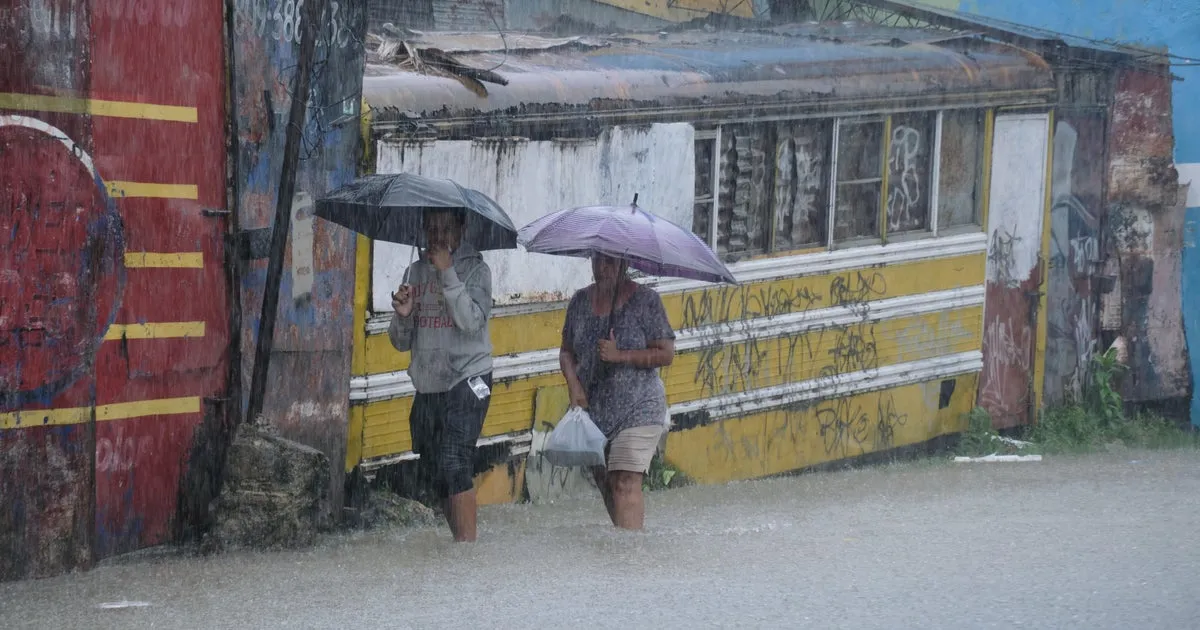
Hurricane Melissa intensified into a major Category 4 hurricane on Sunday, unleashing torrential rains and posing significant threats of flash flooding and landslides across the northern Caribbean. According to the Miami-based National Hurricane Center, the potential impact of Melissa could be life-threatening and catastrophic, particularly for areas in Haiti and Jamaica. Meteorologists have warned that Melissa may further escalate to a Category 5 storm.
The National Hurricane Center has indicated that Hurricane Melissa is expected to reach the southern coast of Jamaica as a major hurricane late Monday or early Tuesday morning. Residents on the island have been urged to seek shelter immediately as conditions are set to deteriorate rapidly. Jamie Rhome, the center's deputy director, emphasized the urgency, stating, "Be ready to ride this out for several days." Meteorologist Andrew Kozak from CBS News Philadelphia warned that Melissa could be the most powerful hurricane to hit Jamaica to date.
Jamaican Prime Minister Andrew Holness has also warned citizens to take the impending weather threat seriously, advising them to take all necessary measures to protect themselves. Predictions suggest that Jamaica could experience torrential rainfall of up to 30 inches, with some areas possibly receiving as much as 40 inches.
The National Hurricane Center has also cautioned that extensive damage to infrastructure, power outages, and communication disruptions are expected across Jamaica. Melissa is anticipated to move near or over Cuba by late Tuesday, bringing up to 12 inches of rain before advancing toward the Bahamas by late Wednesday. In response, the Cuban government has issued a hurricane watch for several provinces, including Granma, Santiago de Cuba, Guantanamo, and Holguin.
As of Saturday, Hurricane Melissa has already claimed the lives of at least three individuals in Haiti and one in the Dominican Republic, with additional casualties reported. The slow-moving storm has made recovery efforts difficult, as it continues to linger in affected areas, causing significant flooding and destruction. Jamie Rhome noted the urgency of the situation, stating, "For places along the projected path of this storm, it is increasingly dire."
In preparation for Hurricane Melissa, Jamaica's government has activated a level 3 emergency protocol. Sangster International Airport in Montego Bay shut down at midday on Sunday, while Norman Manley International Airport in Kingston closed at 9 p.m. on Saturday. With the storm's slow movement, Evan Thompson, principal director of the Meteorological Service of Jamaica, highlighted the challenges posed by prolonged rainfall, stating, "It doesn't allow you to recover." Richard Thompson, acting director general of the Office of Disaster Preparedness and Emergency Management, echoed these sentiments, stating, "There is nowhere that will escape the wrath of this hurricane."
To support the population, more than 650 shelters have been activated across Jamaica, and officials have ensured that warehouses are well-stocked with supplies. Thousands of food packages are pre-positioned for rapid distribution if necessary.
Haitian authorities have reported three fatalities linked to the hurricane, with five others injured due to a wall collapse. Rising river levels have resulted in flooding, and a bridge has been destroyed in Sainte-Suzanne, affecting local residents. Ronald Délice, a director of civil protection in Haiti, noted the growing concern regarding the storm's movement and the challenges faced in distributing food kits, as many residents are hesitant to leave their homes.
In the Dominican Republic, Hurricane Melissa has damaged nearly 200 homes, disrupted water supply systems, and affected over half a million customers. The storm has also downed trees and traffic lights, caused small landslides, and isolated numerous communities due to flooding.
The Bahamas Department of Meteorology has indicated that Hurricane Melissa may bring tropical storm or hurricane conditions to the Southeast and Central Bahamas, as well as the Turks and Caicos Islands, by early next week. Melissa marks the 13th named storm of the Atlantic hurricane season, which runs from June 1 to November 30. The U.S. National Oceanic and Atmospheric Administration had previously predicted an above-normal hurricane season, with expectations of 13 to 18 named storms.